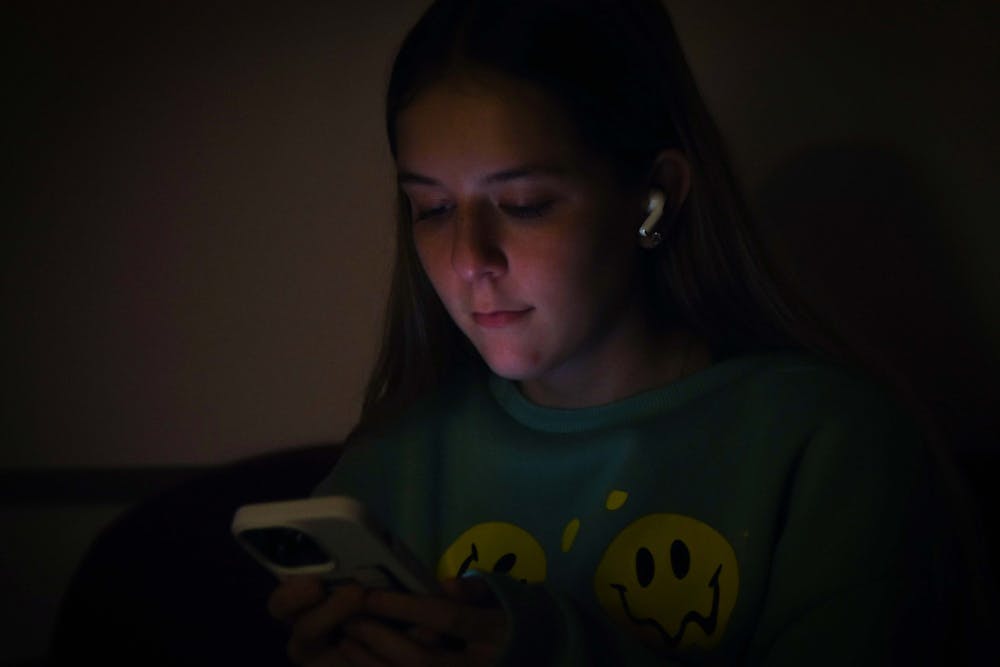
We’ve all seen it, and most of us fall victim to it: wearing noise cancelling headphones while walking to class, or even at times, in class. I vividly recall walking into my first period class my first year of high school after winter break. Having the predictable conversation of “What did you get for Christmas?” was being returned with a widespread, unanticipated response: AirPods. That was four years ago. Now walking out on the streets of Philadelphia, or into any café, it’s rare to see a single person without the two white earbuds sticking out of their ears.
This new trend silences the world around us and limits us to our thoughts. Listening to the newest episode of a podcast, playing "Careless Whisper" on repeat, or even cramming 10-15 minutes of the recorded 8 a.m. lecture you missed — in our fast paced lifestyles, we try to utilize every minute of our day, even the few minutes walking to and from classes. While we may feel a deeper connection with the artists we religiously tune into, we are inversely furthering our pre-existing anti-social bubble of loneliness around us.
An unsaid rule when people wear AirPods or headphones in public is that you don’t approach them. We all voluntarily encase ourselves in a tiny Bluetooth bubble. In all honesty, I can say that I am guilty of this. There are multiple occurrences where I haven’t approached or said “hi” to someone I knew on Locust Walk or in Starbucks because of the inconvenience it would be to take out my AirPods and for them to take out theirs. Here is my formal apology to Ray Bradbury who would be, to say the least, appalled and disappointed. His prediction in "Fahrenheit 451" warned us about the potential for similar devices, aka “seashells” in the story, taking over and ruining societal connections in the long run. Ironically, we are seeing the same issues exacerbated by our unwillingness to reach out to people.
Let’s delve into the aftermath of social isolation during the pandemic. A study conducted last October by researchers at Harvard Graduate School of Education reported that nine out of every 25 respondents to a national survey of Americans reported feeling alone a majority of the time during their day-to-day lives. The most striking result may be that 61% of those aged 18 to 25 reported higher levels than any other age group in the study. Well over a third of young adults reported increases in loneliness since the start of the pandemic and about half of lonely young adults in the survey reported that no one in the past few weeks had “taken more than just a few minutes to ask how they are doing." Gen Z in particular suffers high rates of loneliness, anxiety, and depression. According to a recent CDC survey, 63% of our age group is suffering significant symptoms of anxiety or depression.
AirPods becoming a tool to avoid social interaction is the last thing we need. Why are we willingly exacerbating our currently fragile state of being? How long can we stay away from interacting with the culture around us?
I took it upon myself to practice what I preached for a day. I rarely leave my room without my AirPods in, even if it's just to go down the hall. And yes, it was slightly awkward and loud. But I did make some observations. The majority of people wearing headphones were, unsurprisingly, young adults. While standing in line for coffee, the barista repeated her sentence three times to a kid that had AirPods in and his response each time was “huh?” While their interaction was brief, many people without headphones were greeted with a “How is your day going” or “You should really try this new drink.”
These small and seemingly insignificant conversations are actually very important. Researchers have found that high levels of social integration and an increase in weak-tie interactions leave people with a greater sense of belonging. Looking at this analogically, another group of researchers stated that “Just as a diverse financial portfolio makes people less vulnerable to market fluctuations, a diverse social portfolio might make people less vulnerable to fluctuations in their social network.”
Unplug (or should I say “unpair”) yourself from the technological world. Our time at Penn is going to be gone before we know it. I know I would regret it if I couldn’t accurately reminisce over the environment and people surrounding me during such a vital time in my life. Make small talk. Honor the label of being “the person who I run into at the grocery store that asks me about my dog.” Connect with the world around you. Before you know it, your four years here will be up and you’ll be moving on. Embrace everything in the now.
LIALA SOFI is a College first year studying health and societies from Roanoke, Va. Her email address is lsofi@sas.upenn.edu.
The Daily Pennsylvanian is an independent, student-run newspaper. Please consider making a donation to support the coverage that shapes the University. Your generosity ensures a future of strong journalism at Penn.
Donate




